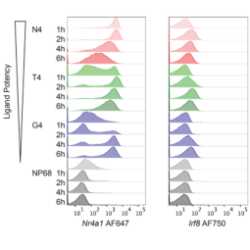
Millions of naïve T cells with different TCRs may interact with a peptide-MHC ligand, but very few will activate. This fine control is orchestrated using a limited set of intracellular machinery. Publishing in eLife, Dr Claire Ma from the Wellcome Clinical PhD programme and Dr Arianne Richard, a joint postdoctoral Fellow from the Griffiths and Marioni labs investigated how changes in stimulation strength alter the programme of signalling events leading to T cell activation. Using mass cytometry to simultaneously measure multiple signalling pathways during activation of murine CD8+ T cells, they found a programme of distal signalling events that is shared, regardless of the strength of TCR stimulation. Moreover, the relationship between transcription of early response genes Nr4a1 and Irf8 and activation of the ribosomal protein S6 is also conserved across stimuli. Instead, stimulation strength dictates the rate with which cells initiate signalling through this network. These data suggest that TCR-induced signalling results in a coordinated activation program, modulated in rate but not organization by stimulation strength.

